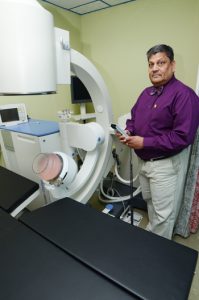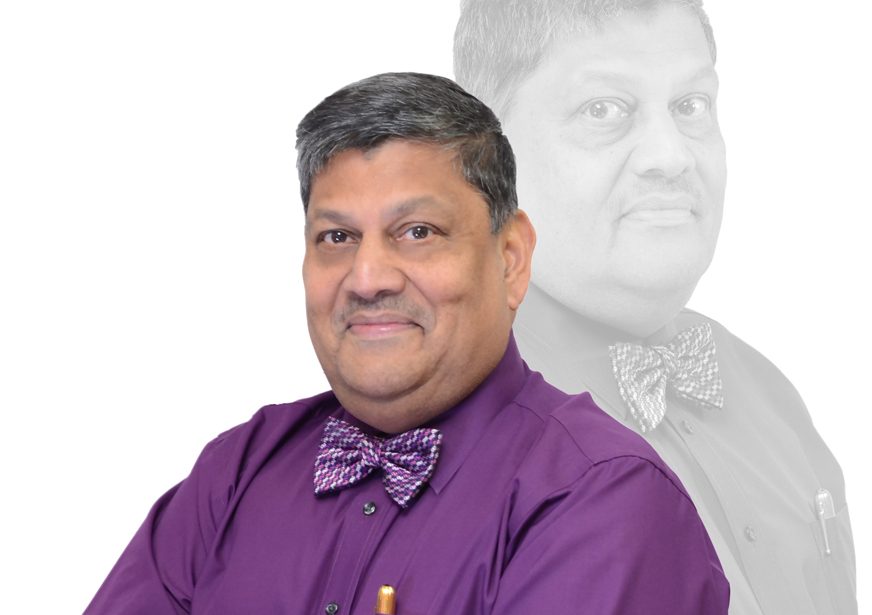It’s not often you meet a legend — and Lall Sawh’s career is certainly legendary.
Dr. Lall Ramnath Sawh, CMT., MB., FRCS, ranks among the uppermost echelons of success in the field of urological medicine throughout the Caribbean.
Pioneer of kidney transplantation in the CaribbeanHe is featured in several editions of the Who’s Who of the World, the International Who’s Who of Intellectuals, and the Who’s Who of Science and Engineering, just to name a few; and was named among the top 100 Health Professionals in the World.
Dr. Sawh is a pioneer of kidney transplantation in the Caribbean, and performed the first live related kidney transplant in the region.
He was one of the first surgeons in the region to conduct minimally invasive surgeries, pioneering the ‘buttonhole’ kidney surgery in Trinidad. He was also the first in the region to use the Dornier lithotripter, a machine that pulverises kidney stones using shock waves.
National Icon and Chaconia Gold MedalistDr. Sawh is a National Icon and Chaconia Gold Medalist (the youngest recipient at his time of receipt in 1993), and holder of 12 local awards for his contribution to the field of medicine.
He has had the honour to attend to patients from all walks of life. He has attended to a former Governer of a Caribbean island, Presidents, Prime Ministers, Chief Justices, Members of the Clergy, Ministers of Government, doctors, lawyers, accountants, teachers and from every walk of life — including even a vagrant.
Dr. Sawh now splits his time between his private practices at Southern Medical Clinic in south Trinidad and at West Shore Medical in the west Trinidad.
He is also an associate lecturer at the University of the West Indies, mentoring the nation’s upcoming professionals in the field of urology — a field that was just emerging when Dr. Sawh entered the profession.
Humble beginnings of medicine
It was a freak accident in his childhood that sparked Dr. Sawh’s interest in the field of medicine.
“Where I grew up in Couva, my parents had a parlour. Every Sunday we ate lunch together, and the children’s role was to choose the soft drinks,” he says. “We had already packed the refrigerator for Monday’s business, and the youngest of us four boys — the baby — pulled the drink from the bottom of the shelf, causing one from on top to fall. A piece of shrapnel cut him in the jugular vein. We rushed him to the Couva Hospital, but it was too late.”
If someone had only known to put their finger and squeeze his neck, he would have lived.After witnessing his youngest brother’s death, the attending doctor’s words came as a blow: ‘If someone had only known to put their finger and squeeze his neck, he would have lived.’
This crushing experience was a career revelation for the young Lall Sawh — but one that would prove difficult to pursue.
“I had ‘champagne taste’ but ‘mauby pocket’,” he chuckles, reminiscing. “Back then, there was no GATE (Government Assistance for Tuition Expenses). My family simply couldn’t afford to send me to Jamaica to study medicine.”
Having always encouraged his nephews to follow medicine, Dr. Sawh’s uncle, who was a pharmacist, volunteered to pay for Lall’s tuition fees at The University of the West Indies, Mona Campus. He also managed to get a part-time job that covered his living expenses in Jamaica.
Then, another tragedy struck. Within the first six months of his studies, he received news that his father had died.
‘Champagne taste’ but ‘mauby pocket’“I was the eldest, and my family needed me… but I didn’t even have the money for a ticket to come back,” he says. “My uncle had paid for me to become a doctor — not for me to abandon my studies to run the parlour. But my little brother, a bright boy doing his A levels at the time, left school and stepped up to take my father’s place.”
His brother’s sacrifice changed the course of his life, allowing him to complete his studies and go on to achieve great success as a doctor and surgeon, specialising in the field of urology.
The field of urology
Urology encompasses medical and surgical diseases of the male and female urinary tract system (kidneys, adrenal glands, ureters, urinary bladder and urethra) and the male reproductive organs (testes, epididymis, vas deferens, seminal vesicles, prostate and penis).
Medical and surgical diseases of the male and female urinary tract systemWhen Dr. Sawh was first studying to become a doctor in the 1970s, the field of urology was only just developing. At that time, a general surgeon performed all types of surgeries including those related to urological diseases.
“As a student, you follow many consultants and learn and train with them, and the one person that really impressed me happened to specialise in urology,” he explains.
“He was such a great doctor, and a great teacher. Under his mentorship, I found myself so in love with the field, so excited as it was so new and yet so diverse — it just made the most sense to me, as it touched on so many aspects of the human body.”
When the time came for him to specialise, he was fortunate to receive a scholarship from the United Kingdom, and the training programme channelled him through rotations at The Royal Infirmary of Edinburgh in Scotland and then at The Institute of Urology in London, England.
He later trained at several institutions in the United States of America, including an Endoscopic Urology Fellowship at The Mayo Clinic in Minnesota, where he learnt the non-invasive pioneering techniques that he soon introduced in the Caribbean.
Challenges of a small island

Despite all that he has accomplished, Dr. Sawh notes that his journey was never easy.
“All along the way, I got shut down, but other opportunities always came,” he says.
“My superior refused to sign the approval to take up a national scholarship as he thought I was too young, but I got through with another and even better one; I submitted a paper to a regional medical journal and it was returned with the note ‘Of no regional interest’, but the same paper when I sent it to the U.S. resulted in my fellowship.”
Even introducing the lithotripter technology was a challenge — as Trinidad and Tobago is so small, at first Dornier did not want to do business with him, as every machine sale also entails significant training and a service contract to maintain the equipment, thereby protecting the company’s brand reputation.
Dr. Sawh notes that while it is often said that we do not have many urologists in Trinidad and Tobago, this is mainly because those that study urology eventually go toward better opportunities abroad.
Those that study urology eventually go toward better opportunities abroadHis own son is now based in Orlando, Florida in the United States, and is performing robotic surgeries — techniques that our twin isle is unlikely to see for some time to come.
Every year, Dr. Sawh attends the annual conference of the American Association of Urologists, and eagerly examines the new equipment in the field — ‘toys’, as he terms it.
But he has to keep himself in check — regardless of what he is interested in, the patient in Trinidad and Tobago may not be able to afford it; and the Trinbagonian market is too small for most companies to take a chance on him like Dornier eventually did, but only after several years of his persistence.
“There was a point when I, too, wanted to stay abroad — there were so many more opportunities,” he adds.
“But my mother became ill, and so I returned home to Trinidad to be with her, and to help pay off the family’s debts. After all that she and everyone else had sacrificed for me — especially my uncle and my brother, the entire family that had always been behind me; it was my time.”
Mentoring the new brood
‘Sacrifice’ is something that Dr. Sawh has always known, and valued as part of his learning in both his personal and professional life.
“I have truly been blessed to have gotten so many opportunities, but I still had to fight at every step of the way. Today, a lot of the young people I teach are not that focused — they come to class late; they always have excuses,” he says.
Education was a privilege and a struggle“For me, education was a privilege and a struggle. When education is given freely, it is not as valued. There are a lot more students nowadays, but only a handful of them are really serious and have that potential.”
He remembers attending a career guidance day, when a student asked him about a doctor’s salary.
“If that is the first thing you want to know, you are definitely in the wrong profession,” states Dr. Sawh. “For me, money was never an issue. No matter what field you are in, if you do something for the love of it, success will follow.”
Despite all the success that has followed him, Dr. Sawh is far from ready to fully retire. Along with his private practice, he is also actively involved in the community, lending his expertise to The Cancer Society, The Family Planning Association, The Diabetic Association, and many community and society groups.
He laments that at the age of 60, he had to adhere to the National Civil Service Regulations and retire from government service at the Port-of-Spain General Hospital.
I think I still have so much more to give“As you get older in the surgical field, you get more experienced, and I think I still have so much more to give,” he says.
At the same time, he also has more to learn — and he is always learning.
“The day my students ask me something I don’t know — and they do ask, because they want to embarrass me! — is the day I need to stop teaching,” he says, laughing.
“To stay on the cutting edge, you have to keep teaching, and keep learning. Always, always, no matter what you do: make sure to keep learning.”
Further Information
- A referral from your General Practitioner (GP) doctor is not necessary. He encourages patients to come directly to him if they believe that his services are needed, as GPs may not always refer to the necessary specialist.
- The lithotripter is a machine that pulverises kidney stones through shock waves in water, and is an alternative to surgical removal. The kidney stones are then able to pass through the patient’s urine.
- Dr. Sawh will soon be publishing a book on Prostatic Diseases (diseases associated with the prostate).

